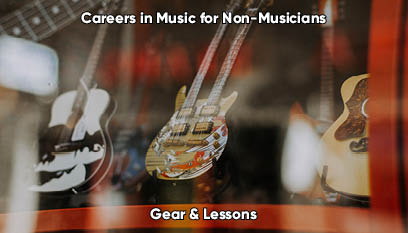(This is Part 4 of a four-part series, Careers in Music That Do Not Involve Performing.)
For my day job I work in student activities at a public university in New England. I do a lot of the traditional things associated with this job, like advising student organizations and putting on leadership programs. But for several years, before life got too busy, I was also able to bring in a bit of my music world into my day job by running a program called Music Mentors.
The premise of Music Mentors was very simple. Over the years I had seen some student bands do better than others because they were able to make one-on-one connections with more established professionals and gain from their experience. So the program aimed to help more students establish those connections.
For each session I’d bring in a variety of folks to talk about what they do in the music world. We’d briefly share some background info on the panelists and then we’d ask the students what they were interested in. That way I knew how to moderate the conversation to make sure the students learned about what they wanted to learn about. About ⅔ of the way through, I would end the formal discussion and encourage students to talk one-on-one with the guests.
This program led to the creation of a few bands, but more importantly it led students into internships and jobs in the local scene.
So in the spirit of Music Mentors, I have prepared a four-part series about Careers in Music That Do Not Involve Performing.
- Recording Industry
- Concerts & Venues
- Radio, Art & Music Journalism
- Gear & Lessons
For this post, I spoke with professionals in musical instrument sales and music teachers.
MUSICAL INSTRUMENT SALES

Courtesy Photo
Lew DiTommaso
Outside Sales Motivator, Richard Dean Associates
Newburyport, Massachusetts
Lew is no stranger to the New England music instrument scene. He was with Daddy’s Junky Music for years, filling multiple roles from store manager to buyer. Lew takes great pride in having been a part of the emerging 60’s music scene and saw The Beatles perform in Boston. Lew also is a certified high school basketball official in New Hampshire.
SGT: What job(s) do you do in the world of music that do not directly relate to actually playing music?
DiTommaso: I have worked in the Music Instrument (MI) Industry for over 42 years, most of which was with Daddy’s Junky Music.
SGT: How did you get started in this type of work?
DiTommaso: For me it all started with a moment of epiphany in October of 1963. I used to help my father in his wood shop in the basement. While I was helping, I was allowed to control the radio. One day the Beatles came on. It was so different from everything else on the radio then.
Then like millions of other kids, when we saw the Beatles on Ed Sullivan (February 1964) that’s what we all wanted to do. I begged my dad to get me a guitar. Later on I was going to college and got a job in consumer electronics and I hated it. That’s when I was lucky enough to meet Fred from Daddy’s and the rest was history.
SGT: What are the important skills for someone interested in your type of work to cultivate?
DiTommaso: The industry has changed so much from when I got started in it, but you still need to understand your customer. I’m convinced that there’s really no difference in the generations. Every generation wants its own army and to belong to that army. It doesn’t matter if their hair is long. It doesn’t matter if they shave it. It doesn’t matter if they’ve got tattoos. Doesn’t matter if they’ve got piercings. They want to belong. And I saw that throughout every generation that I dealt with.
SGT: Do you have any suggestions on how they can get started / get practical experience?
DiTommaso: Hang out at your local shops — if you’re fortunate enough to still have one in your town — and see if you can be helpful. Meet people. Other customers. The staff. You never who’s going to come through the door. Make sure you’re memorable, for the right reasons.
SGT: What are the most common misconceptions about what someone in your line of work does?
DiTommaso: I think folks simultaneously assume that I can knock down a price on something for them or they assume that the price is firm. This is where MI can be like selling anything else in retail. The way one brand’s percentages work vs. another’s is what really drives the ability to make a deal. If you’re nice, and actually talk with your sales clerk about what your needs are, they’ll usually try and help you out. They might not be able to cut you the exact deal you want, but they may be able to recommend a different piece of equipment that meets your needs where they can offer you a deal.
SGT: What kind of other “non-music-playing” professionals do regularly work with?
DiTommaso: Retail is retail regardless of the industry so I’ve worked with buyers, sales managers, accountants, you name it. But since MI is MI and not your everyday widget I’ve also gotten to meet some of the biggest names in music either in the shop, at the NAMM Conference, or the Rock & Roll Hall of Fame Induction Ceremonies.
SGT: Do you have anything else to add?
DiTommaso: When I look back at the millions of kids that watched the Beatles on Ed Sullivan that night, there’s probably less than 1% of us that actually did something in the industry and I was fortunate enough to be one of them. For that I’m grateful.
LUTHIER & BOUTIQUE PICKUP MAKER
 Scott Miller
Scott Miller
Stonewall Instruments | Stonewall Pickups | Naked Guitar Repair
Madbury, New Hampshire
Scott “Stonewall” Miller began his venture into lutheery in high school when he built his first electric guitar and fully restored a 1929 Gibson L-5. After dropping out of Berklee College of Music, he attended Roberto-Venn School of Luthiery, then continued his education apprenticing under Michael Spalt (Spalt Instruments). Stonewall moved to the New Hampshire Seacoast in 2010 to open his own shop offering expert guitar repair, boutique hand-wound pickups, and the highest quality hand-crafted electric guitars. Stonewall’s knowledge of guitar construction, guitar physics, and understanding of tone far surpasses other guitar builders and pickup winders in the industry. Each Stonewall Instrument is built for your eyes, your ears, your hands, and your body (don’t be surprised is he asks for a photo of you). All Stonewall Instruments are completely handmade; no CNCs or computers whatsoever. Scott contributed his expertise to several other posts, including Demystifying the Guitar Set-Up, with Tips from a Luthier, Should You Keep Those Silica Packets in Your Guitar Case? and All About Sweet Guitar Tonewoods.
SGT: What job(s) do you do in the world of music that do not directly relate to actually playing music?
Miller: I’m a luthier, which means I build and repair guitars and related instruments. I also make hand-wound pickups.
SGT: How did you get started in this type of work?
Miller: I went to Roberto-Venn School of Luthiery in Phoenix, Arizona. I did several apprenticeships in Los Angeles before moving back to New England. Through Gary’s Guitars I got in contact with Chris Pern. I worked with Chris very closely for the last year and a half of his life. When he passed away, he left me all of his tools and supplies and I have continued to care for the instruments of the Seacoast just like he did.
SGT: What are the important skills for someone interested in your type of work to cultivate?
Miller: Attention to detail and a knowledge of how the instrument is supposed to work.
SGT: Do you have any suggestions on how they can get started / get practical experience?
Miller: There’s no official accreditation process to become a luthier, which is why it can be really hit or miss when you’re looking for one to care for your guitars or for an apprenticeship. Network. See who’s out there. When you find someone who does good work, ask if you can help.
SGT: What are the most common misconceptions about what someone in your line of work does?
Miller: Lots of people think that a custom guitar, since it’s not coming from a major manufacturer, will cost less. That’s not how it works.
SGT: What kind of other “non-music-playing” professionals do regularly work with?
Miller: I work almost exclusively with musicians, since I create and care for instruments, but I do also work with other luthiers and pickup builders.
SGT: Do you have anything else to add?
Miller: I cannot stress enough how important it is to take good care of your instruments, especially in a place like here in New England where we have so much seasonal variation in temperature and humidity.
SALES MANAGER FOR AUDIO COMPANY

Courtesy Photo
Andrew Blowen
Sales Manager at Fractal Audio Systems
Plaistow, New Hampshire
Andrew Blowen is a New England based musician and songwriter who has performed in a variety of bands and ensembles over the past 25+ years.
SGT: What job(s) do you have (or have you done) in the world of music?
Blowen: In the past, I’ve done some booking and worked in a couple of retail music stores. I also spent a couple of years building trumpets and trombones. I’m currently the Sales Manager at Fractal Audio Systems.
SGT: How did you get started in this type of work?
Blowen: I didn’t set out to work in the musical instrument business. My current position was a “right place, right time” kind of situation. A friend of mine worked for Fractal Audio and knew that I was looking for new opportunities.
SGT: What are the important skills for someone interested in your type of work to cultivate?
Blowen: My particular job requires a lot of customer service and management skills. Multitasking is super important. I do get to spend time with a lot of big-name artists and members of their staff and it’s nice to be involved in a business that’s so closely related to what I’m passionate about. However, in a lot of ways, it’s like any other job at a small company. I really appreciate the relaxed dress code, that’s for sure.
SGT: Do you have any suggestions on how someone who is interested in your type of work can get started and gain practical experience?
Blowen: Most music gear companies tend to hire musicians. Beyond that, the skills and experience are directly related to the position they’re looking to fill. A production manager at an amplifier company is going to need a similar skill set to a production manager at a company that makes T-shirts or kitchen cabinets.
SGT: What are some of the most common misconceptions about what someone in your line of work does?
Blowen: It’s not as glamorous as people might think.
SGT: What kind of other “non-music-playing” professionals do you regularly work with?
Blowen: I work closely with a lot of guitar techs, live sound engineers, recording engineers, etc.
SGT: Do you have anything else to add?
Blowen: It’s great working closely with so many other musicians. There’s an understanding and camaraderie that I really appreciate. Regardless of our backgrounds, ethnicity or religious and political beliefs, we have this one big thing in common. I think that really helps create a healthy, productive, and comfortable environment.
GUITAR TEACHER

Courtesy Photo
Joseph K. Murphy
Guitar Teacher
Epping, New Hampshire
Joseph K Murphy is a musician, music educator, and audio engineer with 15 years of experience. When he is not making musical dreams come true, he is probably making a mean batch of his famous chocolate chip cookies.
SGT: What job(s) do you have (or have you done) in the world of music?
Murphy: I’ve worn a lot of hats over my career in music, from audio production to live sound to teaching private music lessons. I’ve taught over 2000 lessons to students of all ages, and founded a summer camp program that allowed youth to form bands that culminated in a live performance at the end of the summer. This eventually lead to mentoring a youth rock group that had a pretty nice little run in the Seacoast, New Hampshire music scene.
SGT: How did you get started in this type of work?
Murphy: After high school I was offered a volunteer position with my town’s recreation department. They were interested in having music lessons added to their activities, and I was a known musician in town. I cut my teeth teaching for free, which then allowed me to start taking on my own clients outside of the department. This became my main source of income within a few years until I moved on from it.
SGT: What are the important skills for someone interested in your type of work to cultivate?
Murphy: The music world is competitive, so I had to spend a lot of time working on my own marketing to get my name out in the world. I did my own promotion and a whole lot of networking to make sure I was continually bringing in new students. I had a good rapport with my clients, so I usually retained students for years at a time.
To me, people skills are extremely important. Making relationships and maintaining those relationships meant that my clients were more likely to spread word of what I did. If your clients like you, they’ll come back. You’ll build trust with them, and then they tell their friends and you get more business! It’s a great way to work.
SGT: Do you have any suggestions on how someone who is interested in your type of work can get started and gain practical experience?
Murphy: Don’t wait to get started. Often, you have to make your own opportunities, as it is a crowded job market. If you spend too much time waiting for a teaching position to open at a school or at a music store, you’ll be sacrificing that time you could be gaining teaching experience on your own. Be creative. Think outside the box. Get involved with the music scene. Get involved with the community.
SGT: What are some of the most common misconceptions about what someone in your line of work does?
Murphy: I think people believe that music lessons mean a lot of sitting down and practicing scales, or working on some classical piece for a recital week after week. My goal was always to keep the student motivated and playing. There are so many reasons to play music that have nothing to do with becoming a rock star or a professional. It’s the gift that keeps on going.
I certainly wanted to educate the student with at least the basics of music theory, but we could do that along side the music they wanted to learn. I think a lot of teachers believe that as well, these days. The student’s personal goals were always more important to me than if I can get them to shred. Of course, if they wanted to shred, that was totally cool, too!
SGT: What kind of other “non-music-playing” professionals do you regularly work with?
Murphy: When I was teaching through my town’s recreation department, I worked closely with the department’s director for scheduling, use of the venue, planning of programs. We were able to get some grants to help us along with some of our programs, so I would work with their grant writer in that context.
Once I was on my own with the teaching gig, I handled everything. ‘Twas just me and the clients. Maybe my mechanic as I tried to keep my car running to make it to clients’ houses!
SGT: Do you have anything else to add?
Murphy: Teaching music is a rewarding experience. It isn’t for everyone, and you definitely need to have patience, but you’ll find though spreading this awesome gift that you’ll be making a difference in others’ lives. Rock on.
Don’t forget to check out the other posts in this series!
Careers in Music That Do Not Involve Performing:




